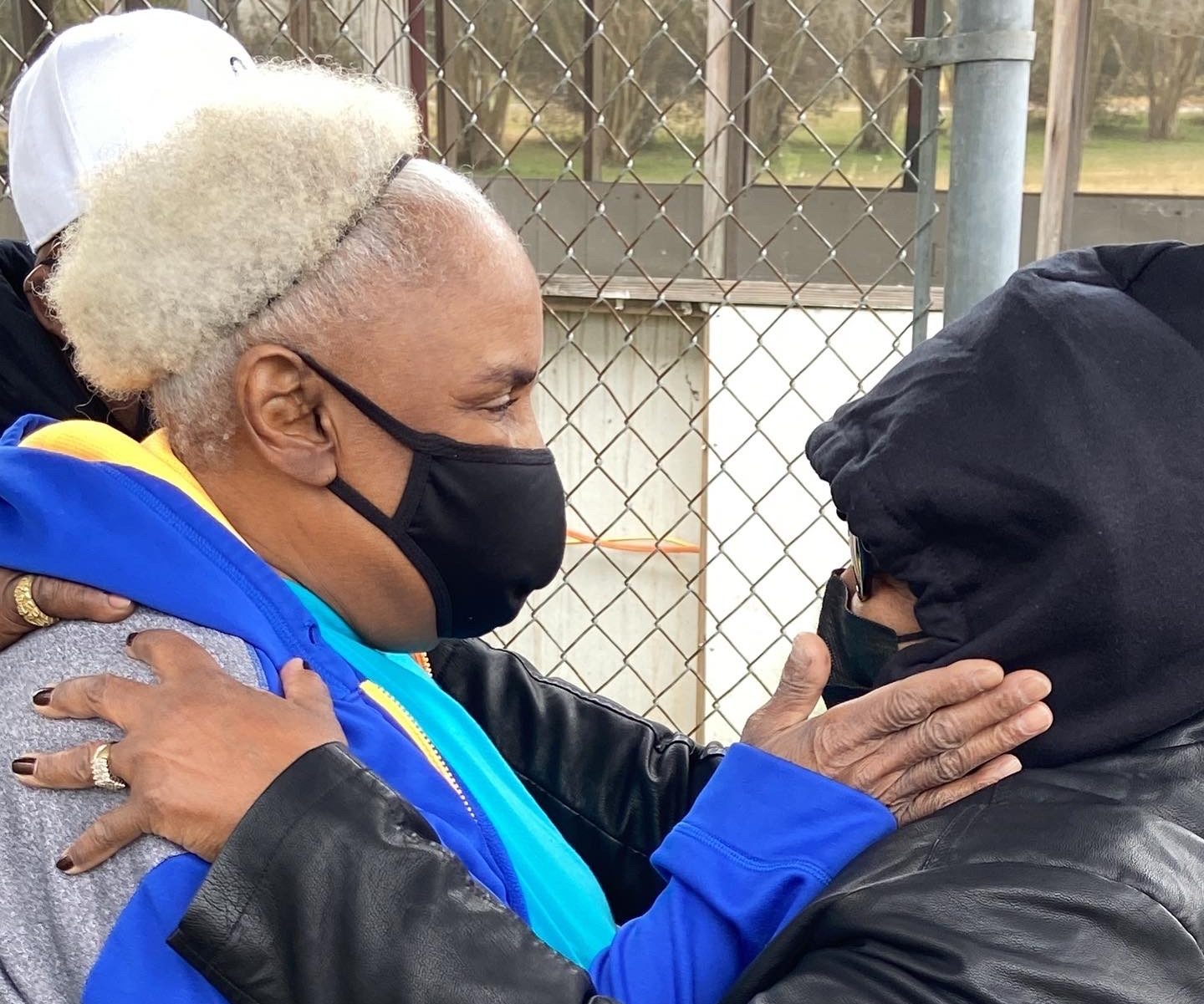After 51 Years In Prison, Louisiana’s Longest-Serving Incarcerated Woman Is Free
Gloria Williams, who became known as “Mama Glo” behind bars, was released Tuesday, more than two years after the state parole board first recommended that her sentence be commuted.

Jan. 25, 2022, was the day Gloria Williams, Louisiana’s longest-serving incarcerated woman, had long been dreaming of.
After 51 years in prison, the 76-year-old had been granted parole. Within hours, she walked out of the gates of the Louisiana Correctional Institute for Women and into the jubilant hugs of her friends and family—including her sister Mary Smith-Moore.
“Over the years, I’ve talked to her, visited her, emailed her,” Smith-Moore told The Appeal. “But to have her touch my face and me be able to hug her, it’s just unexplainable, that emotion, that feeling that you can touch your sister.”
In 1971, Williams, then 25, was arrested in Opelousas, Louisiana, after she and two others tried to rob a grocery store using a toy gun she’d taken from her son. During a struggle with the store’s owner, Budge Cutrera, Williams’s co-defendant, a 16-year-old girl, fatally shot Cutrera with a firearm he kept behind the counter. Nine months later, all three were sentenced to life without parole.
While incarcerated, Williams became involved with the prison ministry and the Big Sisters program, in which long-termers mentor newly-arrived women. Through her counseling and mentoring, Williams earned the nickname “Mama Glo.”
Williams’s release on Tuesday was the product of years of advocacy and patience. In July 2019, she appeared before the Louisiana Board of Pardons and Paroles, which unanimously recommended that Gov. John Bel Edwards commute her sentence to make her immediately eligible for parole. By then, Williams was the only one still imprisoned for Cutrera’s death. The woman who shot him had died 15 years earlier in prison; the other person involved, Philip Anthony Harris, was granted a commutation in 1987.
With the parole board’s blessing, Williams finally had a chance at freedom. But for over two years, the governor took no action on the recommendation for commutation.
Then COVID-19 hit. At the time, Williams was living in a dormitory with dozens of women and no walls or doors separating them.
In early 2020, Williams contracted COVID-19, which developed into bilateral pneumonia. She was hospitalized and placed in the intensive care unit. In May, she was returned to prison. By then, 165 of the prison’s 213 women had tested positive for COVID-19.
Now requiring supplemental oxygen, Williams continued to wait for the governor’s decision. She applied for—and received—an interstate transfer, which would allow her to live with her son and his family in Houston if she were paroled.
Finally, on August 20, 2021, over two years after the parole board’s recommendation, Edwards officially commuted Williams’s sentence, making her eligible for parole consideration. But Mama Glo’s wait for freedom still wasn’t over.
On Tuesday, Williams appeared via Zoom before three parole board members, as well as Cutrera’s son, grandson, and granddaughter.
Williams listened while the three described the pain of losing Cutrera in 1971. “She took away someone we love. We don’t get him back,” Cutrera’s granddaughter said, crying throughout her statement.
Then, it was Williams’s turn to speak. “I cannot change the pain that I’ve caused the Cutrera family,” she started. “Sorry is not enough. I deprived you of your father [and] your grandfather.” Wiping her eyes with a tissue, Williams apologized, stating that she wished she could go back in time and undo her actions.
The three parole board members expressed their condolences to Cutrera’s family, and reminded them that the parole board’s responsibility was to evaluate Williams based on the present circumstances.
“My job today is not to look at the person who did this horrible thing 50 some-odd years ago, but to look at the person she is today,” said parole board member Sheryl Ranatza.
Parole board member Bonnie Jackson said it was the board’s duty to “not consider the crime to the exclusion of everything else,” before citing Williams’s age and low risk score as determining factors in her decision to support parole.
The board members voted unanimously to grant Williams parole, with the stipulation that she have no contact with the Cutrera family.
Hours later, Williams walked out of prison. In addition to her sister and two sons, one of whom was three years old when she went to prison, Mama Glo’s supporters included members of Participatory Defense Movement NOLA (PDM NOLA), an organization founded by a formerly incarcerated couple that had advocated for Williams’s release.
“Mama Glo’s release from prison set a new trajectory for people to believe what’s possible,” Fox Rich, PDM NOLA’s co-founder, told The Appeal. “It will continue to show that everyday people can make a difference in the system.”
Williams’s sister Mary Smith-Moore agreed. “I’m so grateful for the people who stood with us and behind us, who held the doors open for us to walk through.” Four days earlier, Smith-Moore had buried her husband. After the funeral, she prepared to travel to Louisiana for her sister’s parole hearing and possible release. “You have to have somebody when you can’t be there. Families can’t do it alone.”
Williams is now in Texas, reunited with her family, including her two remaining siblings, adult children, adult grandchildren and great-grandchildren, one of whom was born 15 minutes before her release.
